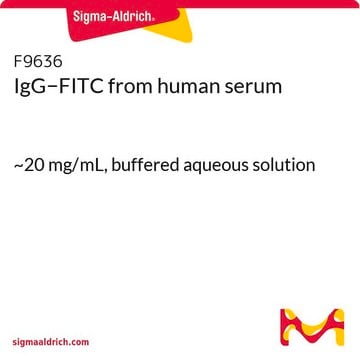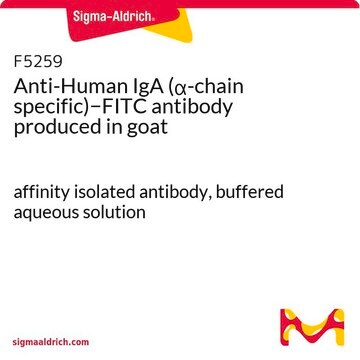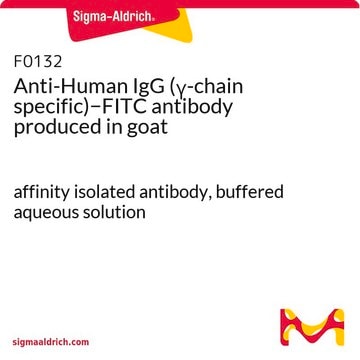F3512
Anti-Human IgG (whole molecule)−FITC antibody produced in goat
IgG fraction of antiserum, buffered aqueous solution
Synonyme(s) :
Goat Anti-Human IgG (whole molecule)−Fluorescein isothiocyanate
About This Item
Produits recommandés
Source biologique
goat
Conjugué
FITC conjugate
Forme d'anticorps
IgG fraction of antiserum
Type de produit anticorps
secondary antibodies
Clone
polyclonal
Forme
buffered aqueous solution
Conditions de stockage
protect from light
Technique(s)
immunofluorescence: 1:32-1:64 using Hep2 cells
Température de stockage
−20°C
Modification post-traductionnelle de la cible
unmodified
Catégories apparentées
Description générale
Immunogène
Application
- in nucleolar staining
- in single color fluorescent labeling for the detection of lytically induced cells
- to detect the model antigen
- in immunohistochemistry
- in immunofluorescence
Forme physique
Clause de non-responsabilité
Vous ne trouvez pas le bon produit ?
Essayez notre Outil de sélection de produits.
Code de la classe de stockage
10 - Combustible liquids
Classe de danger pour l'eau (WGK)
nwg
Point d'éclair (°F)
Not applicable
Point d'éclair (°C)
Not applicable
Équipement de protection individuelle
Eyeshields, Gloves, multi-purpose combination respirator cartridge (US)
Certificats d'analyse (COA)
Recherchez un Certificats d'analyse (COA) en saisissant le numéro de lot du produit. Les numéros de lot figurent sur l'étiquette du produit après les mots "Lot" ou "Batch".
Déjà en possession de ce produit ?
Retrouvez la documentation relative aux produits que vous avez récemment achetés dans la Bibliothèque de documents.
Les clients ont également consulté
Notre équipe de scientifiques dispose d'une expérience dans tous les secteurs de la recherche, notamment en sciences de la vie, science des matériaux, synthèse chimique, chromatographie, analyse et dans de nombreux autres domaines..
Contacter notre Service technique












